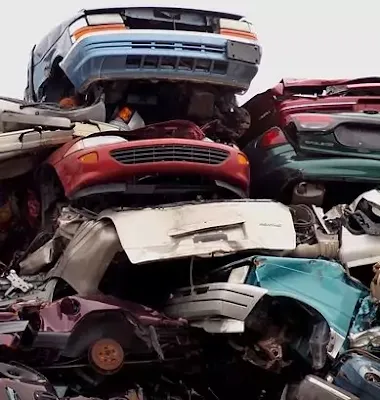Till the current day, out of all the commercial vehicles that run in India only 15% of vehicles are responsible for an overwhelming contribution of 60% to 70% of air pollution in India.
The primary reason is the age of the vehicle. If we have a look in our surroundings, we find at least 2-3 old commercial vehicles for every 12-15 vehicles.
On the other hand, all private vehicles that were manufactured before the year 2000 barely constitute even 1% of all the private vehicles present on the streets.
Yet, the estimated numbers say that this one percent contributes to 15% of the total air pollution by vehicles.
Another matter of concern that arises with the old vehicles is regarding their safety standards.
The safety standards for passengers in the vehicle have changed drastically in just one decade.
The Government of India has begun executing its plan of expanding India's automobile industry and making it a global manufacturing hub.
It is also seeking various alternatives to the crude fuel which powers almost 95% of all the vehicles present on the streets of India.
But the usage of age-old vehicles is proving to hinder the progress of India's dream.
In order to resolve this issue, the government has come up with a new 'Vehicle Scrappage Policy' which was recently proposed in the Budget Session of 2021.
What is Vehicle Scrappage Policy (VSP)?
This policy doesn't force you to sell your old vehicle to scrap. If you wish to keep your old vehicle with you, you can do so and this policy even doesn't deny permission to use it on the streets.
But if you wish to continue using your old vehicle, you will end up paying a hefty amount of Road taxes.
In fact in some places, you may have to not only pay the excess Road Tax for renewal but also bear additional charges.
As per the current draft, commercial vehicles which are older than 8 years have to pay 8% to 15% of Road Tax during the renewal of their registration/fitness certificate. Plus, they also become eligible to pay Green Tax, which is a new form of tax levied on old vehicles.
Private vehicles which are older than 15 years (Diesel/Petrol) are liable to pay green tax.
The green tax is said to vary from region to region. Places that already have a poor air quality index may likely impose more green tax compared to other regions having a lot better air quality index.
The intent behind this decision is to minimize the harmful pollution caused by old vehicles and encourage the consumers to buy new ones.
The Central Government has unofficially implemented the policy upon itself. It has stated that any government vehicle that is older than 15 years will be discontinued and sent for scrapping.
The revenue collected from Green Tax will be sent to a new separate department instead of Treasury which will use this revenue for controlling air pollution in India.
List of Vehicles that are not included in this policy:
1. All types of electric, hybrid, CNG, LPG, and other modes of vehicles that use clean fuel are not included in this policy.
2. Tractors, tillers, and other similar vehicles used in farming are exempted from this policy.
Benefits of Vehicle Scrappage Policy (VSP):
1. The government has stated in this policy that if a consumer scraps his old vehicle, then for any new vehicle he buys, a huge discount or concession will be applied on taxes and the overall price of the vehicle.
2. A significant decrease in the level of pollution.
3. A sharp rise in demand for new automobiles.
As per the above-mentioned statistics, if 15% of old commercial and 1% of the private vehicles decommissioned within a span of 1 to 1.5 years, the rise in demand is certainly inevitable.
4. This policy will act as a catalyst for the Electric Vehicle (EV) industry of India.
Since the purchase of EVs has become the new trend as well as necessity, buyers will more likely bring an EV to their home.
5. With the rise in the growth of EV industries, India can minimize its oil imports which will improve its Forex reserves and ultimately help the layman of the nation.
Current Status of the Policy:
In 2020 the Road and Transport Ministry had passed the policy after interference from the National Green Tribunal (NGT). The draft was then sent to all state governments for approval.
On the beginning days of March 2021, the transport minister gives a green signal to the policy and it is likely that will announce the final draft within the coming few weeks.
The details stated above are from the current draft of the policy. There are high chances that the draft will go under changes as per the requests of various state governments.














1 Comments
Very informative
ReplyDeletePlease do not put any spam links.